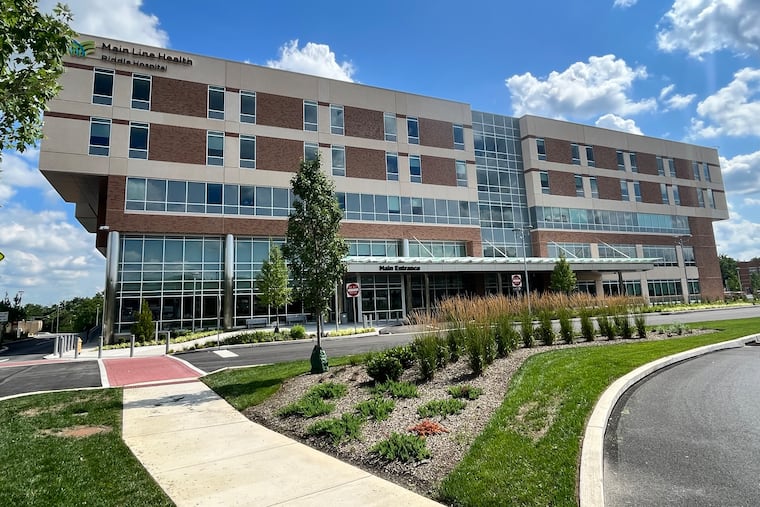Mask requirements are back in place at Cooper and Main Line Health. What does it say about COVID in the region?
In the last week, more than 10% of Main Line's hospital admissions involved patients with respiratory illnesses, said Brett Gilbert, the health system's chief of infectious disease.

Main Line Health is requiring patients, staff, and visitors at all of its hospitals and outpatient facilities to wear masks for at least two weeks, as COVID cases rise and the suburban Philadelphia health system treats more patients with respiratory viruses.
Across the river in New Jersey, Cooper University Health Care has also instituted a masking requirement, according to its website. Visitors to Cooper University Hospital are required to wear a mask starting Friday, and patients and visitors must mask at the health system’s outpatient facilities and at MD Anderson Cancer Center at Cooper offices.
Main Line leaders made the decision with the system’s infectious disease experts, who have been monitoring respiratory viruses in the area as the current “sick season” continues and more illnesses circulate from holiday travel.
In the last week, respiratory illnesses affected more than 10% of the patients admitted to Main Line hospitals, which are located in Philadelphia’s western suburbs. Typically, that number is in the single digits, said Brett Gilbert, Main Line’s chief of infectious disease.
“It was a significant rise, and it will continue to go up based on the data that we’ve established since the beginning of the pandemic,” Gilbert said.
The health system also looked at national and local data on respiratory virus circulation to gauge whether cases might rise.
Increasing COVID and flu cases
Cases of influenza and COVID have been steadily increasing, with levels at about the expected rates for this time of year, Gilbert said. Cases of respiratory syncytial virus, or RSV, are on a slight downturn, he said. RSV, like the flu, is a respiratory virus.
Pennsylvania saw 1,295 new hospitalizations for COVID in the week of Dec. 23, 2023, according to the latest data from the Centers for Disease Control and Prevention. That was slightly lower than COVID hospitalizations at the same time last year, and less than half of the number reported during the spike in cases caused by the omicron variant in January 2022.
Flu cases have also been increasing statewide, with more than 15,000 cases reported in Pennsylvania last week. More than 5% of people visiting Southeastern Pennsylvania emergency departments during the same week were diagnosed with the flu, compared with about 3% with COVID, according to state data.
“Right now, I don’t see any leveling off yet. I don’t think we’ve reached our peak. We’re going to be in very high respiratory virus transmission for the next several weeks,” said Judith O’Donnell, the director of the Department of Infection Prevention and Control at Penn Presbyterian Medical Center.
At least one other hospital system in the state has returned to masking. Since Dec. 20, the University of Pittsburgh Medical Center, the largest health system in the state, which serves mostly western and northeastern Pennsylvania, has required everyone inside its facilities to wear a mask.
Like most Philadelphia-area health systems, Penn is opting to monitor the rise in respiratory illnesses for now, rather than require masks. The system is recommending that staff wear masks while caring for patients, and plans to make “further decisions based on our data and what’s going on locally,” O’Donnell said.
At St. Christopher’s Hospital for Children, a spokesperson said the hospital is monitoring cases and is “prepared to shift to masking or other preventative measures immediately, if indicated.”
A Temple Health spokesperson said the health system was also closely monitoring cases and is “prepared to act as quickly as necessary” to protect patients and staff.
Several hospitals in the region relaxed mask requirements for health workers last spring, and Philadelphia lifted its mask mandate for such workers in May.
City health officials are not considering a mask mandate for the general public, the department said in a statement, noting that it has monitored since November a rise in respiratory illnesses.
People who feel ill should stay home, or wear masks in public places if they’re not able to, the department said. People who test positive for COVID, have high-risk conditions, or are older than 50 should consider asking their doctor about medications for COVID, such as Paxlovid. The city also encouraged residents to continue to get vaccinated for COVID, flu, and RSV.
The department also provides free at-home tests for residents at five resource hubs in Philadelphia.
Creating a ‘protective barrier’
The severity of the COVID cases that Main Line Health has seen in recent months has also concerned its experts.
“The patients that are coming in are not just testing positive and asymptomatic. These patients are quite ill — some requiring admission to the ICU,” Gilbert said. “That was an issue that had really tapered off after the first year and a half or so of the pandemic, but we have several patients who have now come in who are quite ill.”
Gilbert and his team also considered the number of patients in Main Line hospitals and the number of staff required to care for them; the health system’s emergency departments have been “very busy” lately, he said.
“We need all our staff to be healthy and without disease, and masking them will make a protective barrier,” he said.
The Main Line facilities that will require masks for at least two weeks are below. The health system says it will decide whether to extend the requirement based on the rates of respiratory illnesses at the hospital and guidance from national and local health agencies.
Lankenau Medical Center
Bryn Mawr Hospital
Bryn Mawr Rehab Hospital
Paoli Hospital
Riddle Hospital
Mirmont Treatment Center inpatient and outpatient locations
Main Line Health Concordville
Main Line Health King of Prussia
Main Line Health Exton Square
Main Line Health Broomall
Main Line Health Newtown Square
Main Line Health Collegeville
All Main Line HealthCare locations